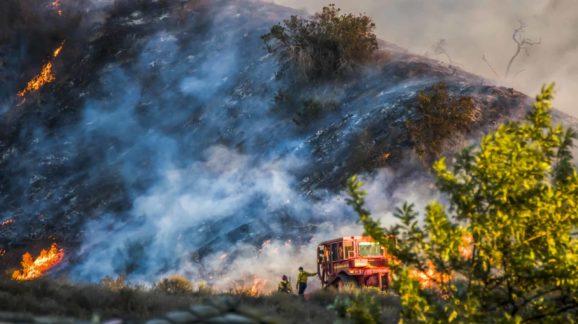Man-made Policies, Not Man-Made Climate Change, Fueling Wildfires, Says Myron Ebell
The catastrophic wildfires raging up and down the West Coast should force a radical reversal of 30 years of disastrous government policies.
Instead, the politicians and environmental pressure groups who gave us these policies are using climate change as a smokescreen to avoid blame and to prevent the change of direction in management needed to restore health to our forests and thereby reduce fire risks.
We might be able to forgive those who, like Democratic presidential nominee Joe Biden, know nothing about what they are talking about when they blame the fires on climate change.
It is enough to point out that the big fires are occurring almost exclusively on public land — national forests, Bureau of Land Management forests and rangelands, and state forests — and not on privately owned forests.
But the Sierra Club, founded by John Muir in 1892 to protect Yosemite National Park and other wonders in California’s Sierra Nevada Mountains, should know better. The Sierra Club has led the campaign to end active management of public lands and since 1996 has officially opposed commercial logging in all national forests.
Yet here is a statement published on Aug. 27 by the Sierra Club’s executive director, Michael Brune: “If any good can come from this fire season, let it be that it serves as a wake-up call for our politicians. We must end the cycle of putting fossil fuel interests before public health and safety — right here, and right now. … California can set the standard for environmental policies across the country. If we sharply reduce emissions, we show the rest of the US what’s possible.”
While Congress has not legally banned commercial logging, Sierra Club allies like Reps. Peter DeFazio, D-Ore., and Jared Huffman, D-Calif., who represent two of the districts hardest hit by this year’s fires, have successfully pushed for management changes that come pretty close to a ban.
Timber production from national forests averaged 12 billion board feet per year in the 1980s. As a result of the “timber wars,” which most notably included listing of the spotted owl as a threatened species under the Endangered Species Act in 1990, timber production declined precipitously through the 1990s and has averaged between 2 and 3 billion board feet since 2000.
The Trump administration, to its credit, has tried to increase the cut to at least 4 billion board feet in the face of fierce opposition from Congress and the environmental movement.
Read the full article at The Press of Atlantic City.
